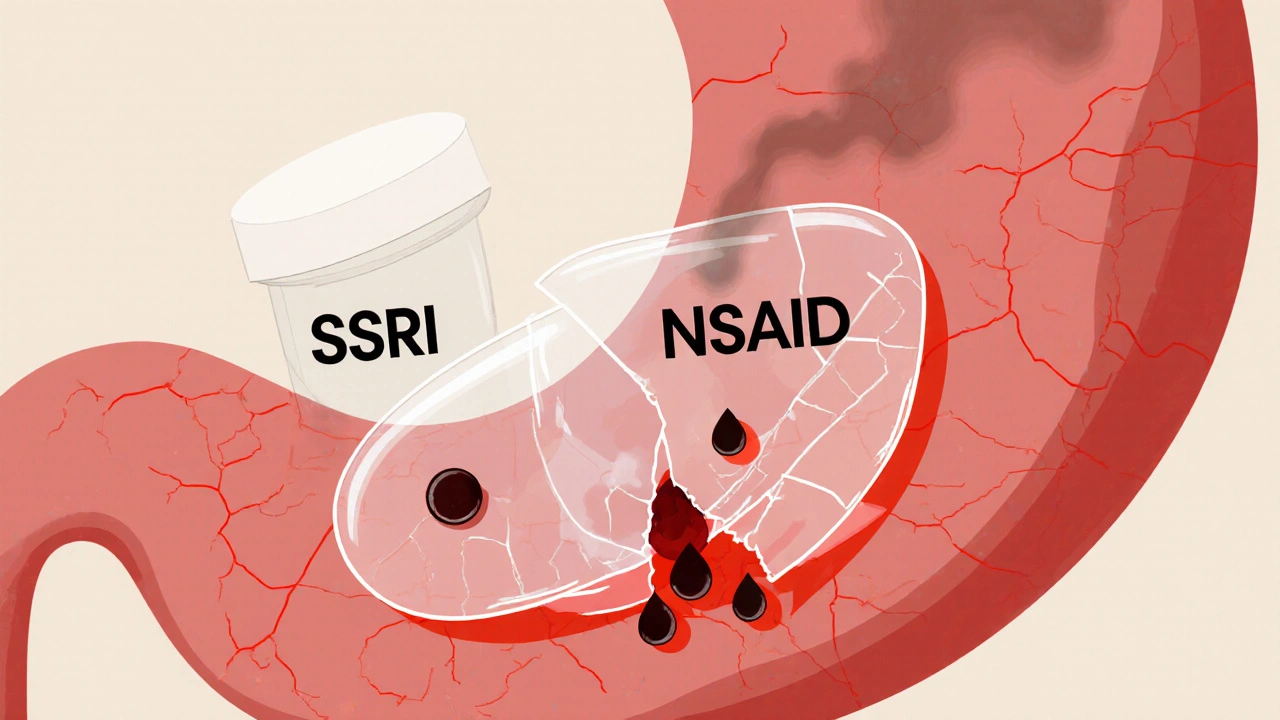SSRIs and NSAIDs: What You Need to Know About Interactions and Risks
When you take SSRIs, a class of antidepressants that increase serotonin in the brain to treat depression and anxiety. Also known as selective serotonin reuptake inhibitors, they include common drugs like sertraline, fluoxetine, and escitalopram. Many people also use NSAIDs, nonsteroidal anti-inflammatory drugs used for pain, swelling, and fever. Also known as non-steroidal anti-inflammatories, they include ibuprofen, naproxen, and aspirin. On the surface, these seem harmless together—antidepressant for mood, painkiller for a headache. But mixing them isn’t as simple as it looks.
Here’s the real issue: SSRIs affect how your blood clots. They reduce platelet function, making it harder for your blood to form clots when needed. NSAIDs do the same thing—especially aspirin and naproxen. When you combine them, your bleeding risk goes up. That means easier bruising, nosebleeds, or worse—gastrointestinal bleeding. Studies show people on both types of drugs are nearly twice as likely to have a stomach bleed compared to those on just one. And it’s not just about the stomach. Brain bleeds, even from minor head bumps, become more dangerous.
There’s another hidden danger: serotonin syndrome, a rare but life-threatening reaction caused by too much serotonin in the nervous system. While SSRIs alone rarely cause it, adding certain NSAIDs—especially those that also affect serotonin—can push levels too high. Symptoms include confusion, rapid heartbeat, high fever, muscle stiffness, and seizures. It’s rare, but it happens. And most people don’t connect their fever or shaking to their painkiller.
You might think, "I’m just taking Advil once in a while." But it’s not always about frequency—it’s about how long you’ve been on SSRIs, your age, kidney function, and whether you’re on other meds. Older adults, people with liver or kidney problems, and those on multiple psychiatric drugs are at higher risk. And no, your doctor won’t always warn you. These interactions slip through because neither drug is "dangerous" on its own.
So what can you do? First, don’t stop your SSRI. Depression and anxiety are serious. But do talk to your pharmacist or doctor before adding any NSAID—even the "over-the-counter" ones. Ask if acetaminophen (Tylenol) is a safer option for pain. If you must use an NSAID, use the lowest dose for the shortest time. Keep an eye out for signs of bleeding—black stools, unusual bruising, dizziness—and call your provider immediately if you notice them.
Below, you’ll find real-world guides from people who’ve navigated these risks. From how sertraline interacts with ibuprofen to what happens when you mix NSAIDs with other antidepressants, these posts give you the facts without the fluff. No theory. No jargon. Just what you need to know to stay safe while managing your health.
Taking SSRIs and NSAIDs together increases your risk of dangerous GI bleeding by 75%. Learn why, who’s most at risk, safer alternatives, and how to protect yourself with proven prevention strategies.
Nov, 1 2025

